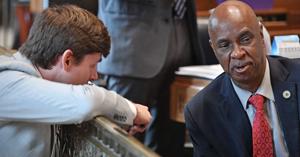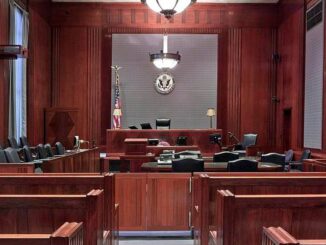
The author of a bill to establish a relief valve for more than 1,000 Louisiana inmates who were convicted long ago by divided juries says a stealth campaign from district attorneys killed it.
The bill by Rep. Randal Gaines, D-LaPlace, died in the House on Thursday by a 48-38 vote.
Gaines’ bill, HB588, would have set up a panel to include three retired appellate court judges who would verify an inmate’s claim of a non-unanimous verdict and decide if it resulted in a miscarriage of justice. If so, those prisoners would go free on parole.
The Louisiana District Attorneys Association did not oppose the bill after Gaines added amendments in committee that infuriated inmate advocates, many of whom already saw it as a steep compromise and turned against it.
The amendments turned more of the burden on those prisoners to generate proof — of a split verdict and of a miscarriage of justice — without court-appointed lawyers. Some critics viewed the amended bill as a placebo that would result in no relief for the only inmates in the United States with non-unanimous verdicts that remain intact.
State voters banned split verdicts in a groundswell in 2018, ending a 120-year-old practice that was birthed in the Jim Crow era and retained a disparate impact on Black defendants and jurors into the modern era.
The U.S. Supreme Court followed suit in 2020, describing Louisiana’s experiment as a sore thumb in a country where juries were always meant to be unanimous. But the court refused to make its ban retroactive.
The Supreme Court in Oregon, the only state to follow Louisiana in adopting split verdicts, recently tossed all of those past verdicts, granting new trials to hundreds. Last year, the Louisiana Supreme Court took the opposite tack, denying retroactivity. The court noted that it’s not what voters approved.
The Legislature appears to be the only avenue left for a statewide remedy for prisoners with split convictions that were final when the U.S. Supreme Court acted three years ago.
They include more than 530 prisoners serving life sentences, according to the New Orleans-based Promise of Justice Initiative, which represents about 800 Louisiana inmates convicted by split juries.
Gaines said after the vote that he thought “we had an understanding,” and that he expected his bill to pass until early this week. He said he began getting word Monday from fellow lawmakers that district attorneys were pushing against it.
“I started off getting the impression it was a few DAs,” he said. “By (Thursday), it seemed to be a cohesive effort by DAs to get the members to vote against the bill.”
Loren Lampert, executive director of the Louisiana District Attorneys Association, said there was no consensus among DAs and thus no position taken by the powerful lobbying group, though “the individual DAs were certainly free to communicate their position to their legislators and many likely did.”
Lampert said the association had been “negotiating towards a fair resolution” since before the state and federal courts both declined to apply the split jury ban retroactively.
At a committee hearing, Lampert noted that a split verdict could mean deliberations ended with two jurors undecided, but it could mean that two jurors dissented because they favored a more severe charge.
Gaines argued that his bill addressed that concern by landing those cases before a panel of retired appellate judges or state Supreme Court justices.
He defended his bill as “narrowly tailored to give a remedy for people who a review of the records clearly shows they were subject to a wrongful conviction” under the defunct jury law.
Gaines’ bill passed out of the House Committee on Judiciary with little support, but a plea from committee members for the sides to work it out. That didn’t happen, Gaines said after Thursday’s vote.
“Now we have no remedy for individuals who may be languishing in prison due to a law that was designed to increase the number of African-Americans in prison,” and succeeded, he said.
Promise of Justice attorney Hardell Ward expressed regret at the failure to reach a compromise, though the group opposed Gaines’ final bill.
“Continuing to do nothing is not what we wanted,” Ward said. “Fundamentally, we didn’t feel it was a bill that would reach any actual relief.”
He pointed to concerns with a loose definition of “miscarriage of justice” and hurdles to prisoners rooting out evidence to support their claims.
Last-ditch efforts to find common ground with DAs went unanswered, Ward said.
“We’re out for universal relief. We’re not out for individual relief,” he said. “We believe all our clients deserve a new trial. If that can’t occur, we‘re going to make sure everyone’s claims are being heard in a proper fashion.”



Leave a Reply